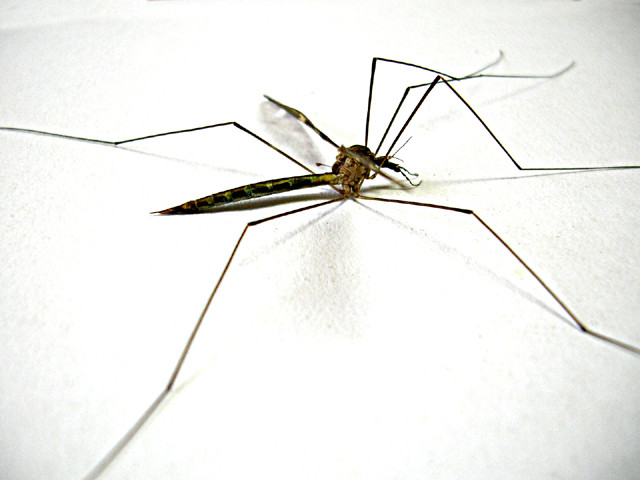35 dengue cases reported over 24 hours
Most of the cases have been reported in Karachi, while at least two people have died because of the virus in 2010.

Over the last 24 hours, eight patients were admitted to the Remedial Hospital and the Ziauddin Hospital each, said Dengue Surveillance Cell (Sindh) Coordinator Dr Shakil Mallik on Monday. Both hospitals are located in North Nazimabad.
Meanwhile, the Karachi Adventist Hospital admitted six patients and the Sindh Government Qatar Hospital received three patients diagnosed with the dengue fever.
The Abbasi Shaheed Hospital, Aga Khan hospital, Civil Hospital Karachi and Anklesaria hospital, each received two patients while the Liaquat National Hospital and the OT Hospital admitted one patient each.
Meanwhile, a 20-year-old man, identified as Rehan, died on September 21 at the Patel Hospital, while 19-year-old Faheem Khan died on September 23 at the Mamji Hospital. Both patients were suffering from the dengue haemorrhagic fever, said Mallik.
According to the reports collected since January, mostly by government hospitals, 432 patients were admitted to various hospitals across the city with symptoms suggesting they had been exposed to the dengue virus. Out of these, 283 were tested as positive, said Mallik, who added that the numbers were going up by the day as more and more private hospitals were sharing their data after receiving warnings from the provincial health department.
Symptoms
An assistant professor of microbiology at the Dow University of Health Sciences (DUHS), Dr Farhan Essa revealed that around 15 cases of dengue are being detected on a daily basis at his private laboratory.
A proper diagnosis of the dengue fever is essential as its symptoms resemble those of malaria and typhoid. “Wrong judgement on the doctor’s part can lead to a patient’s death,” said Essa. Dengue patients are faced with prolonged fever as well as stomach pain, aching bones and eyes. Tiny red spots may also appear all over the body. The dengue fever causes a sharp depletion of blood platelets. This, coupled with a loss of blood from any open wound, can result in a patient’s death.
Essa said that the provincial health department should chalk out a proper strategy to provide blood platelets to government hospitals, so that the patients’ attendants are not required to visit private laboratories.
The cost of treatment
Patients need to arrange for a blood donor if their platelet count drops to a point where they need a transfusion of platelets. Private blood banks can charge between Rs9,000 and Rs11,000 for a bag of platelets, it was revealed.
According to some patients, getting their hands on blood platelets in time was a difficult process even after arranging for a donor and paying a substantial amount of money.
Patients also complained that they were not being provided with free platelets or proper medical facilities at government hospitals such as the Civil Hospital Karachi and the Abbasi Shaheed Hospital, which is why they were forced to go to private hospitals.
Cause and prevention
“Most dengue cases are reported in the months between August and December, when the rainwater accumulated after the monsoon season provides ideal breeding conditions for the aedes aegypti mosquitoes,” said National Institute of Blood Diseases and Bone Marrow Transplant haematologist Dr Tahir Shamsi, who added that the female mosquito is responsible for transmitting the dengue virus.
With an increasing number of dengue cases being reported in Karachi, the government must take preventive measures, such as spraying insecticides across the city to protect people from this disease.
Why are there so many dengue patients?
According to sources in the provincial health department, the figures provided by the Dengue Surveillance Cell are much lower compared to the actual number of dengue cases. While the provincial government had purchased cell separator units, mega unit bags and diagnostic kits worth millions of rupees for the main government hospitals in 2009, sources claimed that the patients were unable to get proper facilities at these hospitals. Sources alleged that this pointed towards “the involvement of an organised mafia” that was working to provide “lucrative business” to certain private hospitals, laboratories and blood banks.
Sindh Health Secretary Syed Hashim Raza said that his department had already sent a summary to Sindh Chief Minister Qaim Ali Shah, asking for a sum of Rs20 million to purchase diagnostic kits and other equipment. He hoped that after the release of funds, dengue patients will be able to avail better facilities at government hospitals. Raza claimed that his department was already overburdened with the task of catering to people affected by the floods, but that the government was taking all possible steps to address cases of dengue, malaria, typhoid and gastroenteritis.
Published in The Express Tribune, September 28th, 2010.



















COMMENTS
Comments are moderated and generally will be posted if they are on-topic and not abusive.
For more information, please see our Comments FAQ